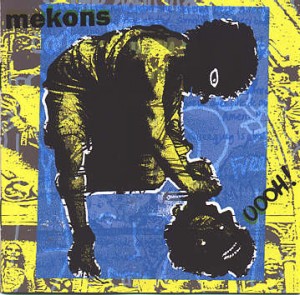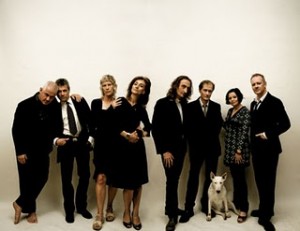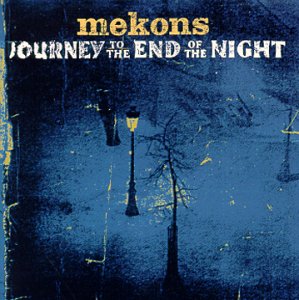FOREWORD: This interview with the Mekons marvelous leader-by-default, Jon Langford, promoted the combo’s celebratory ’02 LP, simply entitled OOOH! In September ’02, the Mekons played three theme nights, each concentrating on a different era. I caught the CBGB set (early period Mekons) and the Mercury Lounge one (late period), but missed Maxwells. This article originally appeared in Aquarian Weekly.
Taking their name from TV’s Dr. Who, resilient British rockers, the Mekons, began as disaffected art school counterrevolutionaries from Leeds living the questionable punk rock dream. Barely able to play their instruments, the amateurish combo began recording what founder Jon Langford described as “vaguely irrelevant overlong songs” way back in 1977, culminating in ‘79s developmental, if awkward, The Quality Of Mercy Is Not Strnen.
After an early breakup, the Mekons regrouped for Country-folk-inspired post-pink classics such as ‘85s Fear & Whiskey, ‘88s calypso-reggae-tinged So Good It Hurts, and a series of resounding ‘90s albums that broadened their formidable reach and built upon an already avid cult status.
To celebrate their 25th anniversary as recording artists, this revolving lineup of Chicago transplants, grounded by Langford, guitarist Tom Greenhalgh, vocalist Sally Timms, fiddler Susie Honeyman, and drummer Steve Goulding, have unleashed the penetratingly triumphant OOOH! (short for Out Of Our Heads).
Reaffirming their position as fanciful warriors strutting beyond doomsday gloom, the Mekons follow up ‘00s brilliant Journey To The End Of The Night with another undeniable accomplishment. Dealing with the spiritual dislocation of our present tumultuous world climate, OOOH! drifts through turmoil and volatility in a sorrowful manner, offering hauntingly anthemic white Gospel illuminations amidst the fury and tension.
The solemn communal requiem, “One X One,” courageously pits united vigilance against the discontentment propagated by overzealous war monarchs. The war-torn, Timms-sung “Hate Is The New Love” whispers heart rendering resolve while the Fairport Convention-styled Gaelic folk of “This Way Through The Fire” shines a dim flashlight beyond the ominous post-Apocalyptic flames.
Between breaks from mixing new tracks for an upcoming record by the Sadies, which sets Langford’s lyrics to their Country-affected arrangements, I spoke to the unqualified leader of the band via phone.
 I thought OOOH! dealt primarily with the religious warfare surrounding the attacks on the World Trade Center and the Pentagon.
I thought OOOH! dealt primarily with the religious warfare surrounding the attacks on the World Trade Center and the Pentagon.
JON: I don’t wanna be like Courtney Love and say we predicted it. But the songs were written and recorded before 9-11. It’s funny how things take on different resonance’s afterwards. An alternative title was Dangerous Bibles, but we didn’t want to make it too topical.
There’s a hymnal religiosity throughout.
I grew up in Wales, where people sing at football (soccer) and rugby games. That was the sort of soundtrack. They’re really good folk songs. Tom (Greenhalgh) and I have been listening to a lot of old Alan Lomax prison and church songs. We’d been doing some art and thinking of putting text and words together. So inevitably we were looking at social historian, E.P. Thomspon’s Witness Against The Beast, which goes into a Lipstick Traces-like look at where poet William Blake came from (examining cultural milieu).
Critic Bob Christgau credits the Mekons with prefiguring alternative Country and the whole No Depression era. Do you get respect form Jeff Tweedy and Jay Farrar, former Uncle Tupelo progenitors?
We get no respect from Jeff Tweedy at all. No. I’m kidding. I’ve done kid’s concerts in Chicago with him and Tim Rutili from Califone recently. We have an occasional trio, the Dads Of Wiggle Worms. We have singing classes our kids have joined in a Chicago folk school.
The same Mekons lineup that recorded ‘85s recently re-released Fear & Whiskey did OOOH! as founding member Ken Lite has returned.
Ken’s been involved with the Mekons, but not live. He’s a collaborator with ideas and we’ve done art together. Being in a band during the ‘90s seemed boring (Ed. Note: due to DJ culture). So we got into art.
What are you trying to express through your art?
I’m trying to express the difficulty of self-expression. (smirky laughter) What’s interesting about the Mekons is we’re a smaller model of a way of working which is on the fringes and not about fame and money. A group of people working together doesn’t have to be about a battle of egos, but instead a community-based surrogate family. The only way to leave is in a box. We’ve been loved and regaled in England. People say we’re the greatest band in the world. Then we confound expectations by not delivering the goods commercially. People would say we’re the next big thing. Then we’d fly off on different tracks, so there was revenge for us to remain in existence.
Well. Mainstream radio could lick my ass. Are you telling me OOOH!’s enchanting sing-along, “Thee Olde Trip To Jerusalem” can’t be enjoyed fully next to spiritually awakened moldy oldies like “Oh Happy Day” or the Byrds “Turn! Turn! Turn!” It has a catchy hook line that’d be nestled next to the Beatles, Kinks, and Doors in the ‘60s.
That’s the trouble. Those were different times. When I was a kid, radio was the main outlet playing new stuff by Roxy Music and David Bowie. That turned me around. Even the Sex Pistols hit Britain’s Top Of The Pops with “Pretty Vacant.” Now, radio has the lid on very tight. The solidity of constipation of mainstream corporate rock radio actually helps people like us since we have our own clearly defined space to move around in now. The structure of that industry bares no resemblance to what we do.
The spiritual awareness of the melancholic, low key testament, “Take His Name In Vain” and the snappy “Only You And Your Ghost Will Know” counter the sexually deviant titillation of the explicit “Tourettes” (from ‘98s Me) and “Come And Have A Go If You Think You’re Hard Enough.”
Usually when we start an album, we have a theme in mind for the collection of songs written. There are ethical issues going on within the subject matter of how you exist.
Singer Sally Timms’ rhyming scheme for “Dancing In My Head” vaguely reminded me of Pussy, King Of The Pirates, the album you did with poet Kathy Acker.
The influence Kathy Acker had on us was clear. But the album was one of our least understood and most disliked albums. Yet we had a great time working with her.
“Bob Hope And Charity” seems to be an ironic paean concerning Hope’s touring duties entertaining wartime American troops.
There was a myth concerning a Welsh king who had his head chopped off while fighting the Irish. He said, ‘Cut my head off and carry me back to Wales’ and he went on to entertain the troops for eighty years. There’s all sorts of myths about the singing head and the magic of the power of voice – like Bob Hope entertaining the troops.
Do you hope downloading will destroy major label greed?
(Sinister laughter) I’m interested in getting paid but the majors are the enemy. Downloading is cool in the sense that Wilco put out their album on the internet and then when it came out, everyone bought it. The majors are too retarded to benefit from it and generate money for artists. All they think about is penalizing artists and keeping the sweets for themselves. They’ll get washed away as they get more extreme ideas how to squeeze money out of people and prevent the free passage of music and information. You can’t stop people from finding good music, but they keep pumping out crap for radio.

